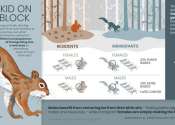Dragonflies reveal how biodiversity changes in time and space
An ecological filter in a pond, such as voracious fish that feed on dragonflies and damselflies, can help ecologists predict how biodiversity loss may impact specific habitats, according to Rice University researchers who ...









